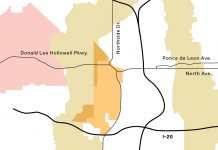
Photographs courtesy of their respective campaigns
Atlanta’s top job is up for grabs, and 14 candidates filed paperwork last week qualifying them to continue their bids for the mayor’s seat. That’s two more than qualified in the sardine-packed 2017 election. Only a few of them will stand out as viable prospects, political scientists tell Atlanta magazine, however, no single candidate is a shoo-in.
Keep an eye on Kasim Reed, Atlanta’s controversial ex-mayor; City Council President Felicia Moore; Councilmembers Andre Dickens and Antonio Brown; and Dentons attorney Sharon Gay as we head toward the November 2 election. One of them will almost certainly become mayor, according to Andra Gillespie, an associate professor of political science at Emory University.
And although it’s too soon to bet on which candidate will win, Gillespie tells Atlanta she sees Reed and Moore as the front-runners. “That leaves the remaining four to fight amongst themselves,” she says, to make it to a seemingly inevitable November 30 runoff.
Sharing the ballot with the top contenders is a slate of political newcomers, including businessman Roosevelt Searles III, real estate investor Kirsten Dunn, nonprofit founder Kenny Hill, labor activist Walter Reeves—not to be confused with the “The Georgia Gardner” of the same name—and Buckhead resident Mark Hammad. There’s also Richard Wright and Nolan English, who appear to lack (easy-to-find) campaign websites or much of an online presence.
Returning to the ticket are businesswoman Rebecca King, who ran an unsuccessful city council race in 2017, and Glenn Wrightson, who sought the mayor’s seat during the same election.
Though some of the the less-well-known candidates may envision a path to the finish line, others could be angling for name recognition from the mayoral race to boost a future political campaign or business endeavor. Or they’re what Gillespie calls “issue candidates,” meaning they’re seeking the spotlight because they have policy ideas they want the city’s next generation of leaders to hear.
Hammad, who’s running on a platform of criminal justice and ethics reform, even wrote on his campaign page, “If I am not successful in the election, I give my permission to the elected mayor to plagiarize any and all of the ideas above.”
For any of the nine less-well-known candidates to surprise everyone and come out on top, it would take what Georgia State University politics expert Harvey Newman calls “imponderables,” meaning cataclysmic events or scandals so outrageous they would either bounce an underdog into the public eye or knock a front-runner out of the public favor.
On the subject of scandal, though, Newman tells Atlanta the city’s electorate doesn’t seem much turned off by ethical missteps—alleged or otherwise. “I’m concerned about voter apathy,” he says. In other cities, the spectacle of a federal probe, for instance—like the one currently investigating corruption that occurred at City Hall on Reed’s watch and the investigation into Brown’s fraud charges—could be nails in a candidate’s political coffin. But not here, not now, he says.
A big question for the former mayor, who Newman sees as the man to beat: “Does the power of incumbency carry over to Reed in his candidacy for a third time after he’s been out of power for four years?” No doubt, name recognition carries weight, and the onus is on the other candidates to distinguish themselves from Reed.
That could be tough in a race “where crime is arguably the most salient issue,” Gillespie says. And at a time when candidates are hard-pressed to market themselves as anti-police misconduct but not anti-police, Newman says, “you need to separate yourself from everyone else walking that tightrope.”
Also top of mind for candidates should be pandemic response and recovery, Gillespie says. With the Covid-19 crisis in full swing, the virus “is likely going to impact how cities operate” for a while. Economic development—or, perhaps, restoration—might be overshadowed by conversations on crime right now, but it’s still the kind of hot-button issue for which a strong platform could give a candidate a competitive edge.
The same goes for housing, infrastructure—namely, transportation infrastructure—ethics, and city-state relations.
Reed, during his two mayoral terms, made a name for himself as someone who could play nice with the Gold Dome, Newman says. Dickens made headlines by pushing legislation that mandates affordable housing creation in some development-ripe areas; Moore co-authored legislation that aimed to bolster government transparency; Brown passed a resolution that called on Atlanta police officers to intervene if colleagues were acting out; and Gay, who flaunts strong ties to Atlanta’s legal and business communities and was once the deputy chief of staff for former mayor Bill Campbell, touted her affordable housing advocacy in a campaign ad released Tuesday.
The direction of the mayor’s race, today, is up in the air, as trustworthy polls are as-of-yet scant and the biggest debates are still forthcoming, Gillespie says. “Most people are still undecided,” she adds. Political ads, however, are sure to ramp up as we near Election Day, and a clearer picture of who leads is sure to emerge in coming weeks and months.
Newman says turnout could pale in comparison to the surge of voters who showed out for the presidential and Senate contests, but that won’t make this consequential contest any less captivating. With city council seats up for grabs, too, the 2021 election has the potential to really overhaul Atlanta’s leadership structures.
Want to learn more about the candidates and where they stand? Check out our candidate questionnaire, where they answered questions about crime, affordability, transit, and more.













